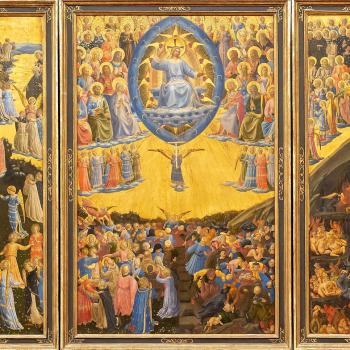Lectionary Reflections
Exodus 1:8—2:10
August 24, 2014
Once again we enter the greatest story in Judaism, the Exodus from Egypt. Immediately, there is the ever-present danger of looking under every rock, digging in the sand, and dredging the Nile for a scrap or two of some sort of historical proof of these legends. People, please give this up now and forever! We are not, I repeat not, reading anything like history here. This is narrative theology, the crucial truth about a people wrapped up in a delightful and unforgettable story. And because some Hebrew author told and wrote it, it is couched in hilarity and barbed with less than subtle attacks on those who are not Hebrews—namely the Egyptians who are nothing less than oppressors of the chosen ones, and at the same time nothing less than fools. How else should one characterize one's enemies when they seem so unbeatable, so impossible to survive?
The tale's basic problem appears in Exodus 1:8: "There arose a new king over Egypt who did not know Joseph." It is more than obvious that no Egyptian, or no one who knew anything in detail about Egypt, wrote that sentence. Pharaoh might be called many things—behind his back I can only imagine the terrible things that some of his subjects called him—but never would he ever be called a king. Other nations had kings; kings were common, a dime a dozen. But there was only one son of the sun god Ra, and he was to be called pharaoh, "great house" in the language. So, a new pharaoh appears, and his prime characteristic is that he knew nothing of Joseph, the savior of Egypt, as the end of the book of Genesis had made clear.
And because this "new king" did not know Joseph, the previous pharaoh's right hand man, he looks at these Hebrews with very different eyes. No longer does he see the heirs of the mighty Joseph, whose shrewd policies had saved Egypt in the midst of the country's terrible famine, whose family had come to live among the Egyptians in peace in the lovely land of Goshen. Now the new pharaoh sees only one thing about these Hebrews: there are just so many of them! "He said to his people, 'Just look! The nation, the people of Israel are both more numerous and more potent than we are. So, let us act wisely toward them, lest they increase (even more), and when war is called they will join our enemies and fight against us and leave our land" (Ex. 1:9-10).
The pharaoh's fears are so absurd historically that any search for history here is completely ludicrous. A pharaoh fearful of a gaggle of slaves? A pharaoh who actually thinks that those slaves are "more potent/stronger" than the great armies of the Egyptians? What? Not only is the fear ridiculous, there is hidden irony in the fear. The word translated "join" in verse 10 is in fact the very word from which the name "Joseph" is derived. Pharaoh may not know Joseph, but the "increase/ addition," in short the "Josephing" of the Israelites, is precisely the origin of his fear. In short, the Israelites are like rabbits; they are masters at multiplication, and I do not mean by that they are good at math. All of pharaoh's "wise" actions that follow are driven by that fact; the chief thing about these slaves is that they just keep getting more and more numerous.
So, pharaoh tries a series of three "wise" plans to shut off their multiplication skills. First, he suggests a very long day in the brick-making places, so long that the last thing on their minds when they get home is multiplication, if you get my drift, and I imagine you do. That is Exodus 1:11. "But the more they were oppressed, the more they multiplied and spread, so that the Egyptians were in dread of the Israelites" (Ex. 1:12). It sounded like a very good plan, a most wise plan, but it did not work. So pharaoh goes back to the drawing board. If sixteen hours making bricks does not divert their attentions from multiplication, then how about twenty? Exodus 1:13-14 describes in detail the ruthlessness and brutality of the desperate Egyptians. But plan two is also a failure.
Now the "wise" pharaoh gets more personal in his wild need to stop the growth of these weird slaves. He calls two midwives, women without families of their own who help other women in the birthing process, to come to the throne room of mighty pharaoh. Shiphrah and Puah appear, and gazing up at the tremendous figure, raised high above them in power, they listen to his wise command. "When you act as midwives to the Hebrew women, and see them on the birthstool, if it is a boy, kill him; but if it is a girl she will live" (Ex. 1:16). The plan, if one stops and thinks just a moment, is thunderously stupid! After all, who gives birth? You really ought to kill the girls, O king!
But the midwives, we are told, "fear God" and do no killing at all, and after some time has passed the census figures for Israelites continue to rise. Pharaoh thinks his command has not been carried out and summons the midwives again. "Why have you done this and allowed the boys to live?" Even though that is not the problem, pharaoh sticks to the stupidity of his plan. The midwives calmly reply, "Clearly, Egyptian women are not like Hebrew women; they are filled with life and give birth before we can get there!" (Ex. 1:19). Not only do the midwives demean pharaoh's own women, but they tell him a whopper of a lie. Certainly not all Hebrew women give birth without help! But pharaoh swallows the lie hook, line, and sinker, and collapsing on a pile of soft rugs, he screams out a terrible command. "Every boy that is born, you shall throw into the Nile, but you may let every girl live!" (Ex. 1:22) That is what the Hebrew text says; the Septuagint Greek adds "born to the Hebrews." I fear that rationalization clouds the point of the story.





